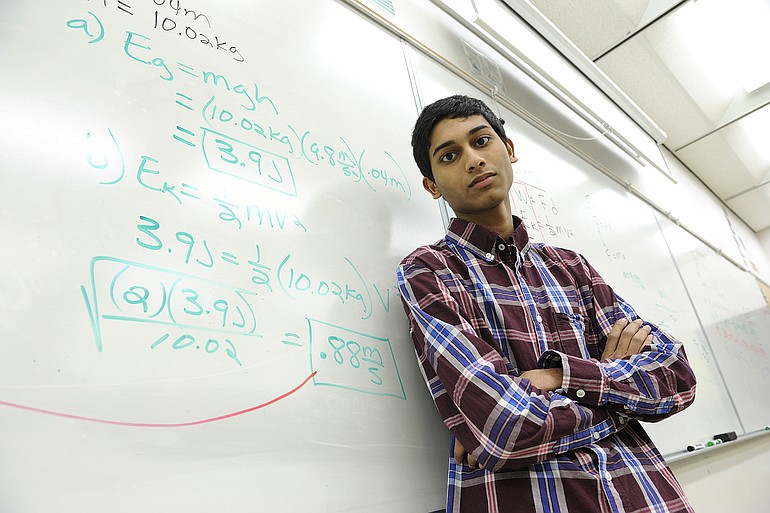Rohith Nagari woke his parents recently in the middle of the night.
“Come see this!” the 16-year-old shouted.
His parents stared at the just-released test results in disbelief. The numbers 2-4-0-0 glowed on the display.
The Mountain View High School junior had just joined an elite group of teens those who score 100 percent on their SATs. Both Rohith and his father credit the teachers he’s had over the years with his current success.
About 1.6 million high school students around the country take the college readiness test each year, according to the College
Board, the nonprofit that issues the tests widely used in college admissions.
Scholastic Aptitude Tests are given in reading, writing and math, with 800 points available in each subject. Out of the 1.55 million test-takers in the class of 2010 the most recent information available some 380 got a perfect score of 2,400.
That’s about one in 4,000 students.
“Yeah, I was surprised,” said the lanky, unassuming teen. “I didn’t expect to get anywhere near that high (of a score).”
He did feel pretty good about his performance after he got done with the Jan. 28 tests. He thought he might have scored around 2,300, which would still be higher than 99 percent of students nationwide, according to the College Board.
The first reading comprehension test was harder than expected.
“It knocked my confidence down a little,” Rohith said.
But he quickly recovered, solved the writing section he considered to be of average difficulty and then moved on to math.
“I guess I’m pretty good at math,” Rohith said with a grin that somehow mixed shyness and confidence.
He’s “pretty good,” all right. Rohith is the president of the school’s science bowl team, which recently won a regional competition sponsored by the U.S. Department of Energy. The team will travel to Washington, D.C. this spring to compete at the national level. Rohith also is in the school’s math club, knowledge bowl and science Olympiad teams.
“He could go into any physical science,” said Les Wilson, the adviser to the science bowl team, who also was Rohith’s physics teacher a couple of years ago.
Rohith’s standout talents in the sciences were obvious from the first day of physics class, Wilson said.
“He sucks up the knowledge,” Wilson said.
Do students like Rohith or his science bowl teammates test the limits of the teacher’s knowledge?
“Oh sure, if they do outside reading and come in with a concept I haven’t refreshed myself on,” Wilson said with a laugh. “I tell them, ‘You guys are smarter than I was at your age I’ve just been around longer.’”
Rohith was a good student from the very beginning, said his father, Sree Thirunagari. (Rohith shortened his last name to Nagari and uses Thiru as a middle name).
Raised in the Evergreen school district, the boy really got going academically in third grade, when teachers suggested he enter a program for gifted students.
“That, from my perspective, was a transformation,” Thirunagari said.
Another transformation occurred in middle school, when Rohith landed in Todd Parsons’ class for gifted young mathematicians. Unlike many other districts, the Evergreen school district offers advanced classes to gifted middle school students in their own school, instead of sending them off to high schools for the higher-level courses.
Having the gifted kids stay with their age group keeps them from feeling like outcasts and boosts their already considerable talents, Parsons said.
Rohith took a pre-calculus class at Shahala Middle School, which meant he was two or three years ahead of his age cohort.
“He’s exceptional,” Parsons said. “He’s very driven. He pushed and stretched and challenged himself.”
Rohith’s father said it was Parsons who did much of the challenging.
“He recognized Rohith’s potential,” Thirunagari said. “He was instrumental in many ways.”
Rohith also is quick to give most of the credit to the instructors he’s had along the way.
“I’ve been really lucky,” the teen said. “I’ve had really good teachers who’ve really challenged me.”
He hasn’t decided on where to apply to college, but hopes to get into a school with good math or science programs, such as Carnegie Mellon, the Massachusetts Institute of Technology or the California Institute of Technology.
But he doesn’t think he’ll end up becoming a researcher at one of those hallowed institutions. His plans are far from final, but Rohith would like to end up in the world of finance.
“It puts math into real-world terms,” he said. “It’s not just on paper; you deal with things that are more tangible.”
He considers himself a pretty average teen outside of his uncanny math chops. His science coach agrees.
“Typically, your really smart kid is a little introverted,” Wilson said. “But Rohith is extroverted. There were times when I had to say, ‘OK, calm it down.’”
Rohith appreciates his history class because it shows him how real-world events relate to each other, he said. He also likes writing in English class, because it gives him a chance for self-expression.
And he said he’s into video games and “a bunch of things.”
“I don’t do anything that particularly out of the ordinary,” he said.
That depends on what you consider ordinary. Rohith loves solving his Rubik’s cube.
He does it in less than 30 seconds.
Jacques Von Lunen: 360-735-4515; jacques.vonlunen@columbian.com; http://www.twitter.com/col_schools.



